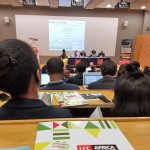The International Trade Institute for West Africa
It is an indisputable fact that international trade is inextricably linked to economic growth and development and that a universal, rule-based, open, non-discriminatory and equitable multilateral trading system as well as a meaningful trade liberalization policy can substantially stimulate development worldwide. Furthermore,a country’s ability to understand international trade and finance issues and be able to negotiate favourable trade terms for its exports and imports is vital for sustainable economic development. However it is also a well-known fact that many developing countries have limited expertise in international trade rules, especially the World Trade Organization (WTO) Law, which is why many of these countries find it difficult to follow discussions at the WTO. It is also true that developed countries have considerable leverage over their developing counterparts which, most often than not, tips the negotiating balance in favour of the powerful countries.
It is against this backdrop that the InternationalTrade Institute for West Africa (ITIWA) has been established to train and coach government officials, legal counsels, business people and students, inWTO Law and practice.
Since 1947 the international community has been developing trade rules to govern internationaltrade so as to ensure predictability, harmonization, increased production and ultimately boost economic development and growth. This effort culminated in the establishment of the WTO in 1995.
The Agreement establishing the WTO consists of a complex web of over 20 agreements together with an attachment of a Member’s specific schedules of concessions and commitments. These documents cover over 20,000 pages. A thorough knowledge of these agreements would safeguard and protectdomestic industries and enable countries to take full benefit of all the advantages that these agreements lend themselves to on the global market.
For African countries most of which do not have adequate human and financial resources to attend WTO courses in Geneva, knowledge of WTO Law is not readily available. Although the WTO sends its staff to developing countries to organize seminars on WTO law, these seminars could be as short as four days in a year for any particular country. This is not enough to build the capacity of developing countries in this area. The presence of ITIWA in West Africa will ensure regular, continuous and sustainable training programs for participants in WTO Law and practice.
What must be noted is that for themoment, the WTO is here to stay. More countries are joining the Organization despite criticisms levelled against it by some non-governmental organizations. The GATT started with 27 Contracting Parties in 1947. Currently, the WTO has 157 Members with many accession requests in the pipeline. Developing countries have to strive to understand the WTO Agreement and take advantage of it. ITIWA is assisting West African developing countries in this direction through its training programs.


What is the ITIWA?
The ITIWA is an international trade institute that has been established to train its students, government officials, parliamentarians, business professionals, legal practitioners, non-governmental organizations and students in WTO Law and related disciplines such as international commercial arbitration and international negotiations skills. In the future, ITIWA will establishe an advisory bureau on WTO Law that will provide legal support to West African developing countries in dispute settlement at the WTO.
Among other things, the ITIWA is introducing in the West Africa region a new trend of academic disciplines in economic law to ensure that students taking its courses acquire knowledge in the dynamics of conducting business at the international level.
WHO ADMINISTERS AND FINANCES THE ITIWA?
The institutional structure of the ITIWA consists of a Management Board and the Executive Director. The Management Board is made up of private people selected from academia, the business community and the general public. It oversees the functioning of the ITIWA, monitors the ITIWA’s finances and adopts the annual budget.
The Management Board comprises five persons who act in their personal capacity. The Management Board takes decisions necessary to ensure the efficient and effective operation of the ITIWA. The Executive Director appoints the staff of the ITIWA, manages its day-to-day operations, submits independently audited financial reports to the Management Board and represents the ITIWA externally.
ITIWA relies on private donations to finance its courses and pay faculty salaries. In due course, the Institute will be self-financed through fees charged.
VISION OF THE ITIWA
The ITIWA seeks to extend within developing countries in Africa the requisite knowledge for the conduct of international business so as to take full advantage of the benefits that exist through the conclusion of multilateral trade agreements. At the same time, the ITIWA provides legal support to governments and private entrepreneurs to ensure that they abide by their obligations and make full use of their rights under multilateral agreements. Furthermore, the ITIWA will broaden the base of experts by training young graduates in international trade law. ITIWA’s International Arbitration Center will offer its services for commercial arbitration, both with respect to the appointment of arbitrators and mediators, and ultimately act as an administering agency.
WHY STUDY WITH ITIWA?
The quest for knowledge of international trade law so as to integrate successfully into the international business environment may underline a person’s objective. In a globalized world, a successful and predictable trade environment is governed by rules. Success in international trade will be determined by how well a government or a trader knows the rules of the game and their ability to apply those rules to their advantage. It also depends upon how well informed a trader will be on current trade issues to be able to make effective business decisions. ITIWA assists its students in this direction.
We wish you every success in your studies.

